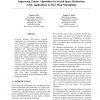Free Online Productivity Tools
i2Speak
i2Symbol
i2OCR
iTex2Img
iWeb2Print
iWeb2Shot
i2Type
iPdf2Split
iPdf2Merge
i2Bopomofo
i2Arabic
i2Style
i2Image
i2PDF
iLatex2Rtf
Sci2ools
GECCO
1999
Springer
1999
Springer
Improving Genetic Algorithms by Search Space Reductions (with Applications to Flow Shop Scheduling)
Crossover operators that preserve common components can also preserve representation level constraints. Consequently, these constraints can be used to beneficially reduce the search space. For example, in flow shop scheduling problems with order-based objectives (e.g. tardiness costs and earliness costs), search space reductions have been implemented with precedence constraints. Experiments show that these (heuristically added) constraints can significantly improve the performance of Precedence Preserving Crossover--an operator which preserves common (order-based) schemata. Conversely, the performance of Uniform OrderBased Crossover (the best traditional sequencing operator) improves less--it is based on combination. Overall, the results suggest that conditions exist where Precedence Preserving Crossover should be the best performing genetic sequencing operator.
| Added | 04 Aug 2010 |
| Updated | 04 Aug 2010 |
| Type | Conference |
| Year | 1999 |
| Where | GECCO |
| Authors | Stephen Y. Chen, Stephen F. Smith |
Comments (0)

